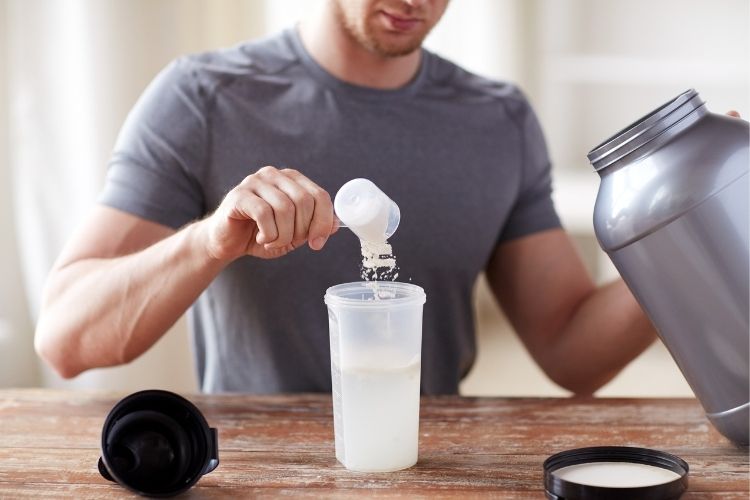If your fitness goals include building muscle and enhancing your performance, BCAA supplements might have caught your attention. BCAA, or Branched-Chain Amino Acids, are among the most popular nutritional supplements in the sports world due to their claimed benefits. Athletes, especially bodybuilders and those engaged in strength training, often pay close attention to their amino acid intake. Some athletes specifically take BCAA supplements to maintain muscle protein balance. Understanding the facts about amino acids and BCAAs and their effects on your body can help you manage your diet. If you’re wondering what BCAAs are and what they do, continue reading for more details.
What is BCAA?
BCAA stands for Branched-Chain Amino Acid. Branched-chain amino acids are a special group consisting of three amino acids.
BCAAs make up about 35-40% of the body’s protein stores. Amino acids, the building blocks of life, are molecules that come together to form proteins. Proteins provide the basic structural components for muscles, as well as the brain, nervous system, blood, skin, and hair. They are also necessary for the acid-base and fluid balance in the body. The human body requires amino acids to perform various functions, such as breaking down food, promoting muscle growth, and repairing muscles.
Out of the 20 amino acids needed by the human body, 11 are synthesized internally. The remaining nine must be obtained through diet and are therefore called essential amino acids. This group includes ‘leucine, isoleucine, and valine,’ which are known as BCAAs.
- Leucine: Used in the body for protein synthesis and tissue regeneration.
- Isoleucine: Helps with wound healing, supports the immune system, and is involved in the production of many hormones.
- Valine: Plays a special role in muscle protein synthesis, tissue repair, and supporting energy levels.
All essential amino acids play a critical role in the process of protein production and muscle building. However, BCAAs have a unique molecular structure that makes them particularly beneficial for the body’s muscular system. About 50% of the essential amino acids in muscle protein are BCAAs. Most amino acid catabolism (breakdown) occurs in the liver. However, the situation is different for BCAAs. The catabolism of leucine, isoleucine, and valine takes place in the skeletal muscles, thus providing a more targeted effect on muscles. Unlike other essential amino acids, they serve as an excellent source of energy for muscles during exercise.

What Does BCAA Do?
What Does BCAA Do?
BCAA, containing amino acids primarily leucine, as well as valine and isoleucine, offers several benefits:
- Prevents muscle loss and accelerates muscle recovery, thereby indirectly contributing to muscle growth,
- Increases the body’s protein synthesis and prevents the loss of amino acids,
- Reduces fatigue in muscles and prepares athletes more quickly for their next physical activity,
- Some studies have also shown that BCAA usage can have positive effects on the liver. BCAA supplements are commonly available as ready-to-use protein powders and pills. The standard formulation for these products is two or three grams of leucine for every gram of isoleucine and valine (2:1:1 ratio). Although some products contain significantly more leucine, there is no definitive evidence that this is more effective than the “standard” ratios. Pills, although not as easily digestible as their powder counterparts that are mixed with water, are a preferred form for BCAA consumption.
There are numerous BCAA supports with customized formulations for different purposes. The BCAA market offers an unlimited range of product options, from pills formulated only with high doses of BCAA for those who do not want to add other supplements or more calories to their diet, to enriched alternatives. In addition to BCAAs, many products may contain ingredients linked to ergogenic aids or enhanced performance such as citrulline (related to increased circulation), beta-alanine (endurance), and caffeine (explosive power). Some products are formulated with ingredients that can have lipolytic or fat-burning effects. Even if you consume an adequate amount of protein, BCAA supplementation may not be necessary, but it can be used in addition to daily intake to increase muscle protein synthesis between meals, support performance while fasting, and protect muscles.

When Is BCAA Used?
BCAA supplements can be consumed before, during, or after exercise.
Among athletes, it is common to consume BCAAs before and immediately after training sessions. Particularly in intense exercises, especially those strength training sessions lasting more than an hour, you may see athletes consuming BCAAs even while on the move. Another popular use of BCAA supplements occurs when an athlete exercises on an empty stomach or does not consume quality protein with meals. Additionally, it is common for some athletes who want to build muscle quickly to take supplements in the morning and before bedtime.

What are the Benefits and Risks of BCAAs?
While nutrition supplement brands claim that BCAAs help improve athletic performance, contribute to muscle development, and generally facilitate the recovery process after activity, there are studies to the contrary. According to the Office of Dietary Supplements there is unfortunately very little evidence to support the claims made by brands.
BCAAs are often consumed to enhance muscle structure. Although it is well known that proteins are necessary for muscle building, it is unclear whether BCAAs provide more benefits than other essential amino acids. According to a study published in Frontiers in Physiology[, taking BCAAs after resistance training helps increase muscle growth. However, since this study was conducted with only 11 healthy young male volunteers, the results are not widely applicable. Muscle soreness is a common side effect seen after intense training. The pain can often be a sign that your muscles are responding to your workout. Delayed Onset Muscle Soreness (DOMS) can occur 24 to 48 hours after strenuous exercise and can impair performance, especially when severe. BCAA supplements can be useful for enhancing muscle recovery and reducing DOMS after exhausting workouts. Some evidence suggests that BCAA supplements are better than passive rest after challenging exercises. According to research published in the Journal of Human Kinetics in 2020, taking BCAA supplements before exercise can reduce blood serotonin levels, supporting increased endurance. Serotonin is believed to play a role in fatigue during long aerobic exercises. Additionally, a 2017 review suggests that while BCAAs may benefit muscle development, their effect is limited when it comes to damage.

As for the risks of BCAAs, the dangers are generally assessed based on the amount consumed and existing health conditions. According to ODS, up to 20 grams of BCAA supplements can be taken daily. However, BCAA supplements can be extremely harmful to some individuals. For example, it is not recommended for individuals with Maple Syrup Urine Disease (MSUD), a rare metabolic disorder, to take BCAA supplements[4]. People with MSUD may not produce the enzymes needed to break down BCAAs. Lacking the enzymes necessary for protein metabolism can lead to serious problems due to the toxic buildup of amino acids in the blood[5]. BCAAs may also cause an increase in blood sugar levels during and after surgery. Cancer patients, alcohol users, pregnant women, and nursing mothers are advised to be cautious with BCAA supplements.
What Are the Foods with a High BCAA Ratio?

Although most adults consume enough protein, they may not choose food sources that provide all the essential amino acids. In such cases, supplements might come to mind. But do you really need a BCAA supplement? Experts say that as long as you consume the right foods in the right amounts, the answer is no. When you consume foods containing amino acids, you also benefit from other components provided by the food. Plus, you have the assurance of knowing exactly what you are consuming. Here are the main foods that naturally increase your BCAA intake:
- Meat, poultry, fish, eggs
- Beans, lentils, quinoa, brown rice, chickpeas
- Cheese, yogurt, milk
- Whey protein
- Tofu and tempeh
- Nuts and other seeds

Although most protein-rich foods contain BCAAs, some foods are richer in BCAAs than others. Some of the foods with the highest BCAA ratios include beef, lamb, cheese, milk, and yogurt. Additionally, you can benefit from the advantages of BCAAs by adding complete proteins such as whey protein to your healthy and balanced diet.
While nutrition experts agree that the best way to consume BCAAs is through natural foods, you should not forget that you need all the essential amino acids, not just BCAAs, to build muscle. Most complete proteins are obtained from animal products. If you are following a vegetarian diet, you can find plant-based proteins as well. Foods such as beans, lentils, nuts, and soy products contain BCAAs. However, plant-based foods contain less BCAAs compared to animal products.
To build and maintain muscle, it is necessary to achieve a positive muscle protein balance. Experts suggest that consuming 0.6 to 0.9 grams of protein per kilogram of your body weight can help you reach the ideal balance. On the other hand, those who engage in strength training may need more protein. Most athletes consume at least 1.3 grams of protein per kilogram of body weight for muscle protein balance. Adding protein to your daily meals is easier than you might think. For instance, you can make your oatmeal with milk; add chicken, beans, nuts, boiled eggs, or low-fat yogurt to your salad. The recovery and rest period is a very important part of the exercise routine for athletes at all levels, whether amateur or professional. Resting to repair and strengthen muscles between workouts gives the metabolism the time it needs. The secret to being in harmony with your body both mentally and physically is quite simple: proper nutrition, rehydration, and sufficient sleep.
When it comes to popular supplements like BCAA, which have not been definitively proven by scientific research, it is advisable to be informed and cautious. While BCAA supplements may offer some benefits, their effects are quite limited according to scientific data. There is inconsistent evidence about the efficacy of branched-chain amino acids for athletic performance. Many studies suggest that BCAA supplements do not enhance exercise or athletic performance. Some research indicates that regular consumption may reduce exercise-associated fatigue and muscle soreness.
Although BCAA supplementation is commonly accepted as an effective method to achieve optimal muscle growth, merely consuming dietary supplements will not strengthen and enlarge your muscles. You need to follow a comprehensive plan for training and nutrition. Adding a BCAA supplement to a comprehensive strength training and nutrition program can help stimulate muscle protein synthesis and enhance muscle development. If you are considering supplementing your diet with BCAAs, it is advisable to consult with a nutritionist to decide which product and dosage amount is more suitable for you.


